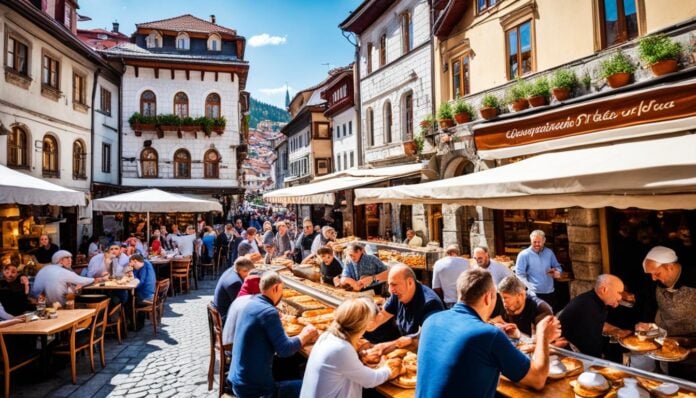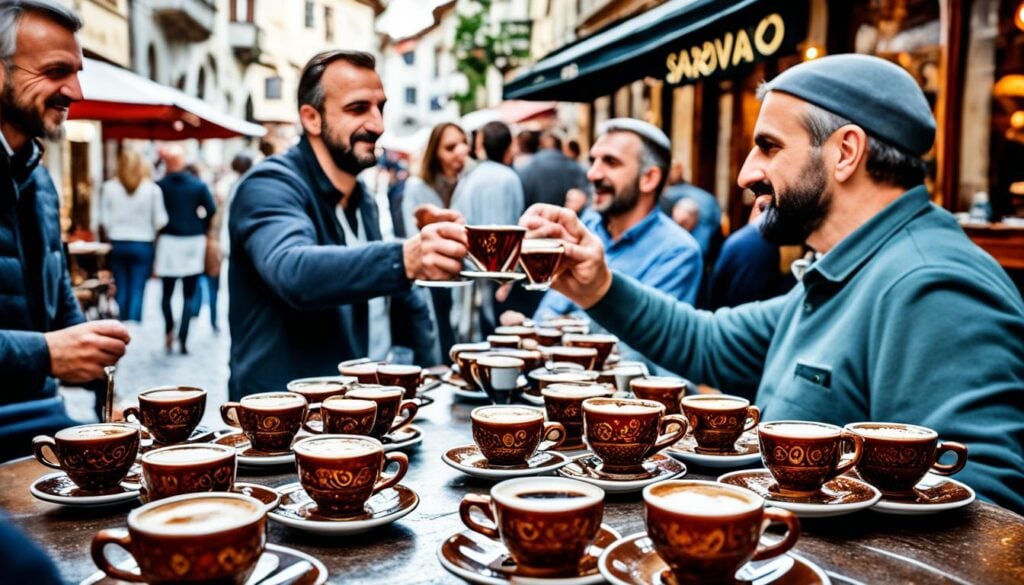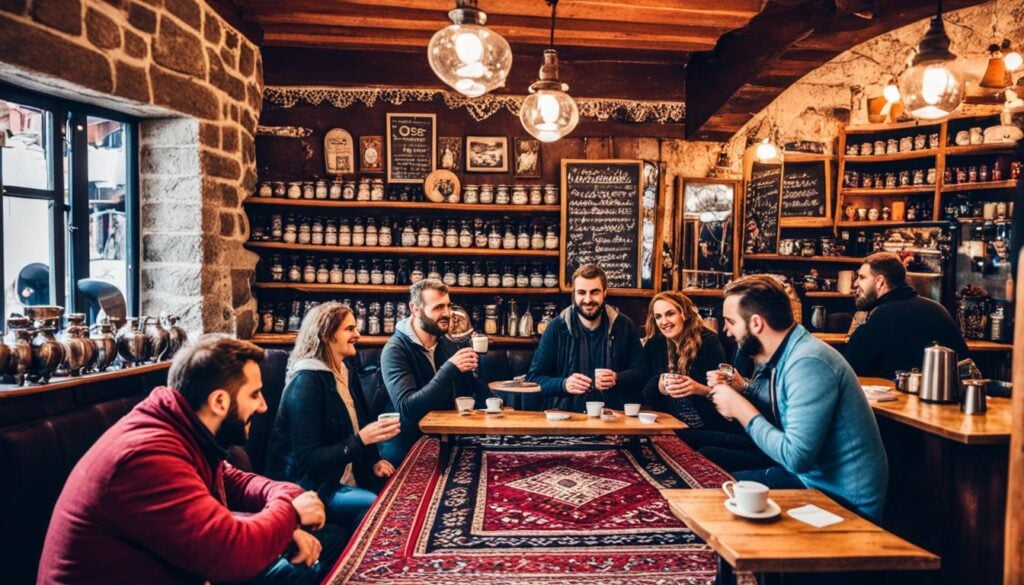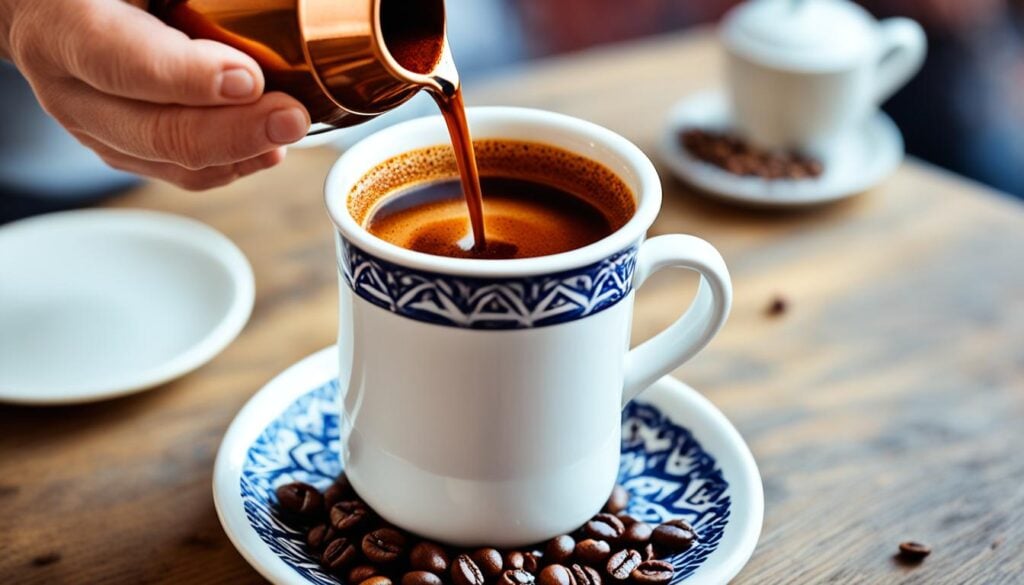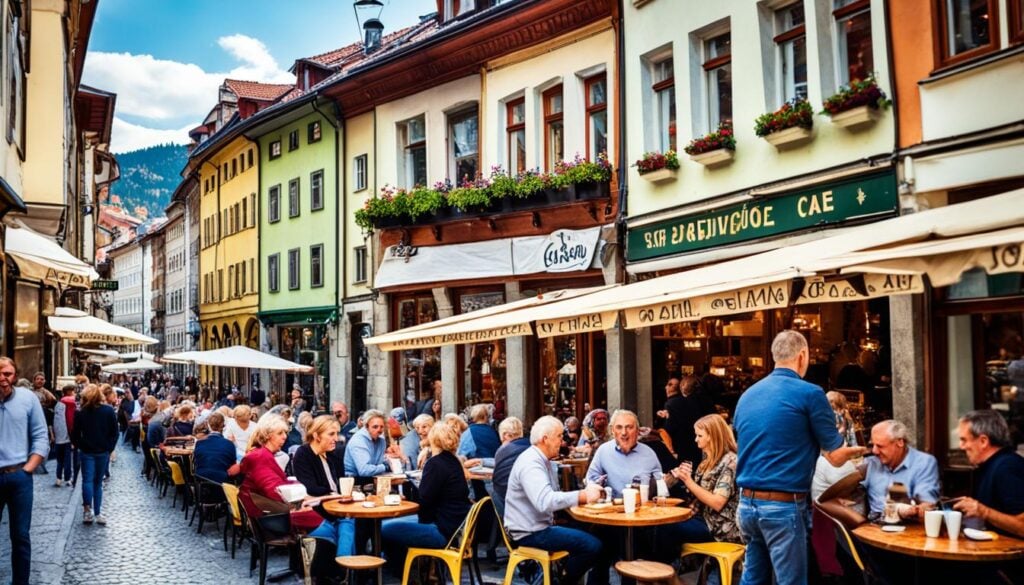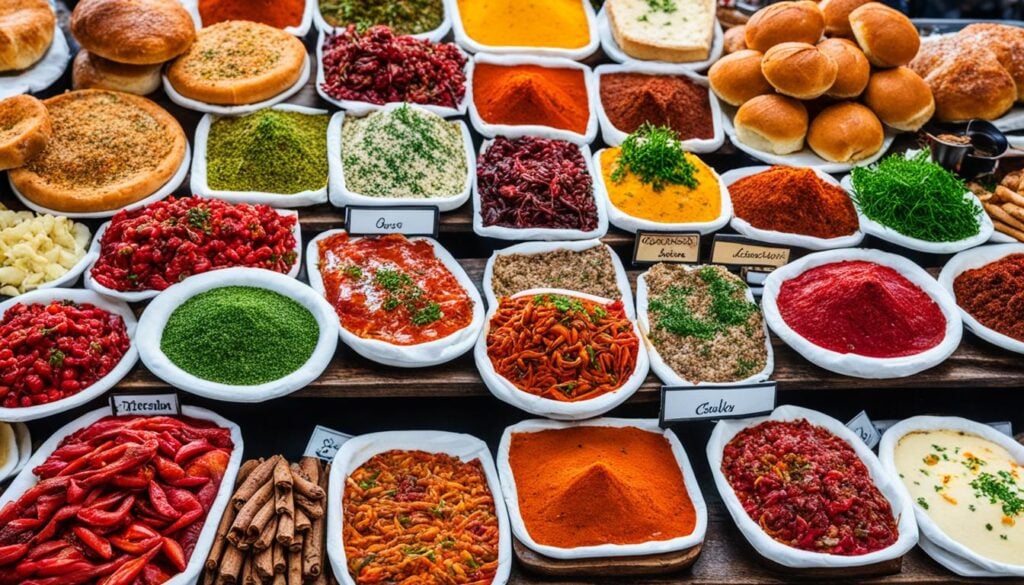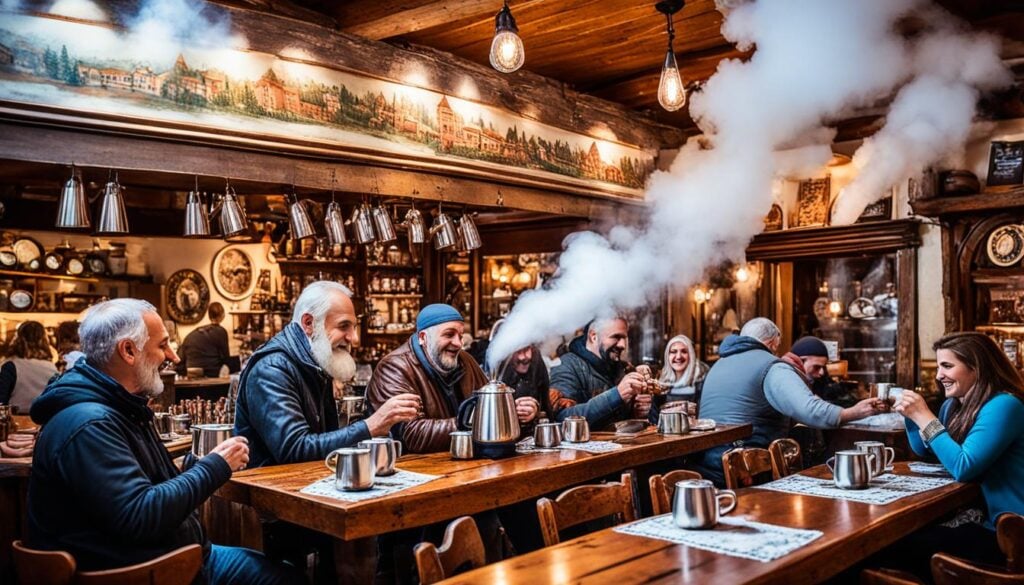Have you ever asked yourself about Sarajevo coffee culture? How did it mix European charm with Turkish coffee rituals? What makes Sarajevo’s coffee scene so alive and welcoming? Let’s explore the story behind Sarajevo’s rich coffee culture.
Sarajevo stands as the heart of Bosnia and Herzegovina. It’s famous for its history and beautiful buildings. But there’s more. It blends European coffee culture with Turkish coffee traditions. This fusion creates a spellbinding experience for anyone who loves coffee.
The History of Sarajevo Coffee Culture
Travel back in time to learn about Sarajevo’s coffee culture. Centuries ago, the city started its love affair with coffee. This was during the Ottoman Empire’s rule and the beginning of Bosnian coffee customs. Coffee became a big part of Sarajevo’s culture, shaping its heritage.
In the past, traders and merchants carried coffee to Sarajevo. Soon, the city was buzzing with coffee lovers. Bosnians saw coffee as more than just a drink. It was a symbol of welcome, friendship, and sharing moments together.
Today, Sarajevo keeps its coffee tradition alive. The old coffee houses, called “kafanas,” take visitors back in time. These spots are more than just places to drink; they’re living history, preserving the art of traditional Turkish coffee making.
“Coffee is a ritual, an experience that brings people together. In Sarajevo, it’s about more than just a cup of coffee; it’s about fostering connections and savoring every sip.”
Making coffee in Bosnia is serious business. The process involves boiling ground coffee in a special pot. It is then served in small cups without handles. You get to choose how strong or sweet you want your coffee. This brewing method is seen as an essential part of Bosnian culture.
Sarajevo’s coffee story goes beyond the old coffee houses. Today, modern cafes also celebrate its rich culture in new ways. They mix traditional coffee customs with fresh ideas to please all kinds of coffee lovers.
The Evolution of Sarajevo Coffee Culture
Sarajevo’s coffee scene has changed over time, but it’s still true to its roots. It keeps the heart of Bosnian coffee traditions while adding modern trends. Turkish coffee rituals are a strong part of its history.
Specialty coffee shops bring European coffee trends to Sarajevo. They offer various brewing methods and unique flavors. These places are perfect for anyone who loves coffee. They let you enjoy the world’s coffee culture while staying true to Sarajevo’s tradition.
Sarajevo’s coffee culture perfectly mixes history, tradition, and new ideas. It’s a special part of the city’s charm, loved by locals and visitors for its unique coffee experiences.
Sarajevo’s Coffee Houses: A Cultural Legacy
Enter the world of Sarajevo’s coffee houses and dive into its deep coffee culture. These places are not just for coffee; they are important for culture and gathering. They are where people meet and hold lively talks.
The coffee houses have become a key part of Sarajevo’s social life. Each one has a special feel and look. They show off Sarajevo’s rich coffee traditions through their historic looks and inviting smells.
In Sarajevo, the highlight is the Turkish coffee ritual. Ancient and detailed, this ritual uses a small copper pot and special cups for coffee. People enjoy the flavors slowly.
It’s not just the coffee that makes Sarajevo’s cafes special. It’s also the vibe, the setting, and the talks that happen. People come here to chat, tell stories, and bond over their love of coffee.
“Sarajevo’s coffee houses are like cultural landmarks,” says Emir Hadžihafizbegović, a famous actor from Bosnia.
“It’s where art, politics, and everyday life mingle. Sitting there, drinking your coffee, you feel the city’s heartbeat. The talks range from deep philosophy to exciting football matches. It shows the true spirit of Sarajevo.”
Notable Coffee Houses in Sarajevo:
| Coffee House | Location | Distinctive Features |
|---|---|---|
| Muzej Čaršija | Baščaršija | A historic coffee house with an exquisite collection of coffee-related artifacts. |
| Čajdžinica Džirlo | Kazandžiluk | A hidden gem known for its cozy atmosphere and a wide selection of teas. |
| Inat Kuća | Baščaršija | A traditional house turned coffee house, offering stunning views of the Miljacka River. |
| Zlatna Ribica | Grbavica | A contemporary coffee house with a vibrant art scene and cultural events. |
No visit to Sarajevo is complete without its coffee houses. Whether you love coffee or cultural experiences, these places give a real look into Sarajevo’s coffee world and friendly people.
The Art of Turkish Coffee in Sarajevo
Sarajevo is famous for its unique coffee culture. This culture dates back many years. The practice of making Turkish coffee is at its heart.
In Sarajevo, making and enjoying Turkish coffee is like an art. It all starts with finely ground coffee beans. They are boiled in a small pot called a cezve.
This method brews the coffee to reflect its deep flavors. The drink is both strong and aromatic.
“Turkish coffee is not just a drink, it’s a way of life. It symbolizes hospitality, socializing, and connection between people.”
Drinking Turkish coffee in Sarajevo is a special experience. It’s about more than the flavor. It involves unique traditions and rituals.
This includes reading fortunes from coffee grounds and slow sipping. Each act enriches the moment.
The Symbolism of Turkish Coffee
Turkish coffee in Sarajevo symbolizes traditional values. Making and sharing this coffee means welcoming others. It’s how locals show hospitality and friendship.
The act of sipping Turkish coffee is about being mindful. Its strong flavors wake up your senses. This encourages a moment of peace and reflection.
Aesthetic Presentation
How Turkish coffee is served in Sarajevo matters. It’s often in a small cup, a fildžan. These cups are beautiful and colorful, adding to the joy.
It’s served with water to cleanse the palate. This gesture highlights the care in Sarajevo’s coffee culture.
| The Art of Turkish Coffee in Sarajevo | |
|---|---|
| Distinctive brewing method | Strong and aromatic beverage |
| Meaningful rituals and traditions | Symbolism of hospitality and friendship |
| Aesthetic presentation | Mindfulness and relaxation |
The Best Coffee in Sarajevo
Sarajevo is known for its top-tier coffee. It offers a wide range to everyone. Whether you’re a coffee expert or someone who loves a good cup, Sarajevo has what you need.
At Brew Brothers, they find the best coffee beans worldwide. Each coffee they make is full of flavor. It will make you want more.
Cikma brings a piece of history with its Bosnian coffee. They use an old way to make it. The smell and taste will feel like a journey through time.
Kazandziluk mixes European and Sarajevo’s coffee traditions. It is a unique and welcoming place. They create new flavors with the best beans and brewing skills.
Caffeine Lab is a hidden treasure for coffee fans. In a quiet area, they offer special coffee beans and crafts. It’s perfect for those serious about their coffee.
Tga Coffee stands out with its varied coffee menu. They serve classic and new flavors with quality. The atmosphere and design make it a favorite spot for many.
Explore Sarajevo’s Coffee Delights
Anywhere you go in Sarajevo, great coffee awaits. From quiet cafes to trendy spots, the city is alive with coffee culture. Enjoy the best in Sarajevo and the warmth of its coffee places.
| Coffee Shop | Description |
|---|---|
| Brew Brothers | Specialty coffee shop with meticulously sourced coffee beans from around the world. |
| Cikma | Cozy coffee shop offering an authentic Bosnian-style coffee experience. |
| Kazandziluk | Charming cafe that fuses European coffee culture with Sarajevo’s unique flair. |
| Caffeine Lab | Hidden gem boutique coffee shop with a carefully curated selection of single-origin coffee beans. |
| Tga Coffee | Trendy coffee shop known for its eclectic menu and commitment to quality. |
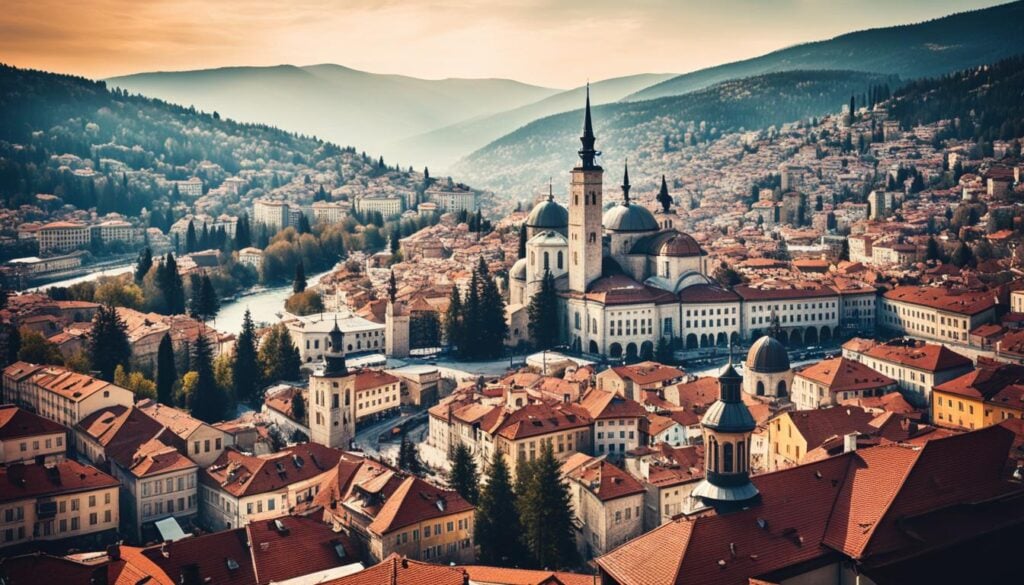
The Sarajevo Cafe Scene: Where Culture and Community Converge
Join in the lively Sarajevo cafe scene, a place where locals and visitors meet. They enjoy the city’s coffee culture. Sarajevo’s cafes attract people from around the globe. You can enjoy traditional Turkish coffee or modern espresso.
You’ll see Sarajevo’s history and culture in its many cafes. As you wander the streets, you find cafes with a unique feel. They’re great for meeting, relaxing, and talking, making you feel part of the community.
The cafe scene in Sarajevo blends European and Turkish coffee cultures. This mix offers a one-of-a-kind experience. You can drink Bosnian coffee or enjoy a cappuccino. The city’s cafes offer a wide variety of coffee.
When in Sarajevo, don’t miss the cafe scene. Enjoy the smell and taste of coffee. The cafes invite you to slow down. They help you connect with Sarajevo’s energetic coffee culture. It doesn’t matter if you love coffee or simply want to relax. The cafes welcome everyone.
| Cafe | Location | Specialty |
|---|---|---|
| Café Tito | Old Town | Bosnian coffee |
| Inat Kuća | Baščaršija | Turkish coffee |
| City Pub | Ferhadija | Espresso-based drinks |
| EGOIST Espresso Bar | Čengić Vila | Specialty coffee |
Here are some of the must-visit cafes in Sarajevo:
- Café Tito: Located in the heart of the Old Town, this cafe is famous for its traditional Bosnian coffee.
- Inat Kuća: Situated in Baščaršija, this historic cafe offers an authentic Turkish coffee experience.
- City Pub: Found on Ferhadija Street, this modern cafe specializes in espresso-based drinks.
- EGOIST Espresso Bar: Nestled in Čengić Vila, this cozy spot serves specialty coffee crafted with precision and care.
Every cafe in Sarajevo has a special charm. From traditional to modern, there’s something for all. Experience the Turkish coffee tradition or try modern coffee creations. Sarajevo’s cafe scene is sure to impress and create lasting memories.
Exploring the Coffee Culture Neighborhoods
Take a journey through Sarajevo’s coffee hotspots, each with its own charm. Baščaršija’s historic feel and Ferhadija’s modern vibe draw coffee lovers in. Discover ancient rituals in Baščaršija and modern trends in Ferhadija.
In Baščaršija, the heart of Sarajevo’s coffee scene, you can dive into history. Traditional Ottoman-style coffee houses welcome you with the scent of Turkish coffee. Here, Bosnian hospitality shines in vibrant conversations over a cup.
“Baščaršija is a true gem in the heart of Sarajevo, with its cobblestone streets and charming coffee houses. It’s the perfect place to relax and take in the rich coffee culture that defines this city.” – Local coffee enthusiast
Head to Ferhadija for the newest in coffee culture. This lively place has cafes offering everything from espresso to pour-overs. Coffee lovers will find their match with the variety here.
No matter where you go in Sarajevo, you’ll find coffee that suits your style. From quiet spots for solo coffee moments to lively venues for meeting locals, there’s something for everyone.
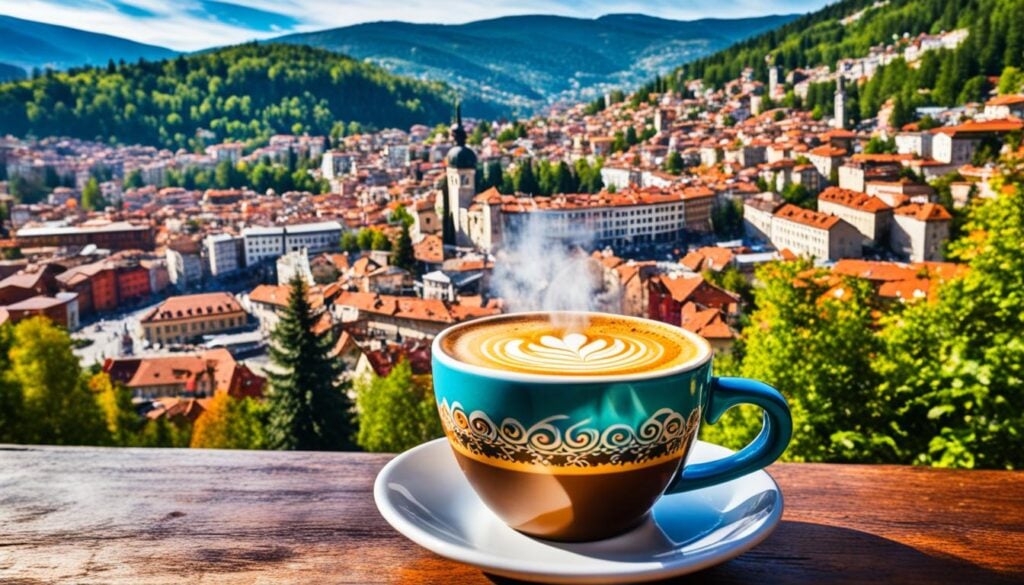
Beyond Coffee: Culinary Delights and Coffee Pairings
Exploring Sarajevo’s rich coffee culture reveals more than coffee. It leads you to culinary delights that perfectly match your coffee. You can enjoy traditional pastries to delectable desserts. These flavors change how you see coffee pairings.
Start your day with a “Pita,” a traditional Bosnian pastry. It comes in savory or sweet types, with thin, flaky layers filled with spinach, cheese, or meat. Enjoy it with Sarajevo’s top coffee for a heavenly experience.
Have a slice of “Tufahija” for dessert. It’s poached apples stuffed with walnuts and honey, topped with cream. When paired with Bosnian coffee, it creates an amazing mix of tastes.
If you want something richer, try the “Baklava.” It’s a sweet pastry of filo, nuts, and syrup. This pairs well with Sarajevo’s bold coffee, creating a mix of textures and tastes.
“The combination of traditional Bosnian pastries and Sarajevo’s coffee is truly a match made in heaven. The flavors and textures of the pastries perfectly complement the richness and complexity of the coffee, creating a culinary experience like no other.”
Sarajevo has a coffee pairing for everyone. You can choose from strong espresso to creamy lattes. Have an espresso with chocolate cake for a perfect balance of flavors.
For something different, pair your coffee with “Grasak,” a bean soup. Its earthy flavors match well with Sarajevo’s coffee, adding a new dimension to taste.
For a refreshing option, try iced coffee with “Dzem,” a fruit preserve. The preserve’s fruity taste pairs wonderfully with the coffee. This combo is a great choice for anyone who loves bright flavors.
A visit to Sarajevo isn’t complete without trying its culinary and coffee fusion. Take the time to enjoy the pastries and dishes that highlight the city’s best coffees.
Recommended Culinary Delights for Coffee Pairings in Sarajevo:
| Culinary Delight | Coffee Pairing |
|---|---|
| Pita | Bosnian-style coffee |
| Tufahija | Bosnian coffee with a hint of cardamom |
| Baklava | Espresso or Turkish coffee |
| Chocolate cake | Strong espresso |
| Grasak (bean soup) | Strong black coffee |
| Dzem (fruit preserve) | Iced coffee |
Preserving Sarajevo Coffee Culture: Innovations and Traditions
Sarajevo’s coffee scene reflects its deep history and lively traditions. Its coffee houses maintain an authentic feel. Yet, new coffee shops are adding innovation to the traditional Bosnian coffee way. This mix is key to keeping Sarajevo’s unique coffee culture alive and well.
The heart of Sarajevo’s coffee tradition lies in its traditional brewing methods. Places serving Bosnian coffee use cezves and džezves, just like old times. This way of brewing shows respect for the long process of coffee making. It ensures the Bosnian coffee taste remains as rich and aromatic as ever.
Modern cafes in Sarajevo do their part by blending new flavors with old preparation methods. Baristas there experiment a lot, making the coffee scene fun and interesting. They manage to stay connected to Sarajevo’s coffee roots while attracting younger people. This blend of tradition and modernity gives Sarajevo’s coffee culture a unique edge.
Reviving Traditional Coffee Rituals
Sarajevo’s coffee houses are keeping the city’s coffee traditions going strong. These historic spots demonstrate how coffee has been prepared for centuries. When making coffee, they start by grinding fresh beans. The ground coffee then goes into a cezve and brews to perfection over heat.
When ready, it’s poured into a džezve. It’s served with a small water glass to cleanse the palate. This process not only makes the coffee taste great but also is a cultural experience. It helps keep Sarajevo’s identity alive.
Supporting Local Coffee Producers
Backing local coffee farmers is a must for keeping Sarajevo’s coffee culture strong. The city’s beautiful surroundings offer perfect spots for coffee growing. By buying beans directly from these local farmers, cafes and shops ensure quality. They also help the area’s economy thrive.
With the combined efforts of using old and new coffee making methods, Sarajevo’s coffee culture is kept vibrant. The ongoing support of local farmers is vital. It all comes together to safeguard the city’s unique coffee charm and tradition.
Conclusion
Sarajevo’s coffee culture blends European charm with Turkish coffee rituals. This mix is deeply linked to the city’s history. Sarajevo offers unique coffee that catches the interest of locals and visitors alike.
Experience Sarajevo’s rich coffee culture and Bosnian coffee traditions. These traditions are a big part of the city’s charm. Enjoy the preparation of each cup and learn its traditional meanings. Join conversations at the city’s famous coffee houses.
Sarajevo caters to every coffee lover’s preference, be it traditional or modern. You can explore coffee spots in different neighborhoods. From historic Baščaršija to the trendy Ferhadija, Sarajevo’s café scene is vibrant and welcoming.
The city’s modern coffee shops mix old traditions with new approaches. Sarajevo’s coffee culture shows the spirit and strength of its people. They’ve kept this important part of their heritage alive for many years.

































